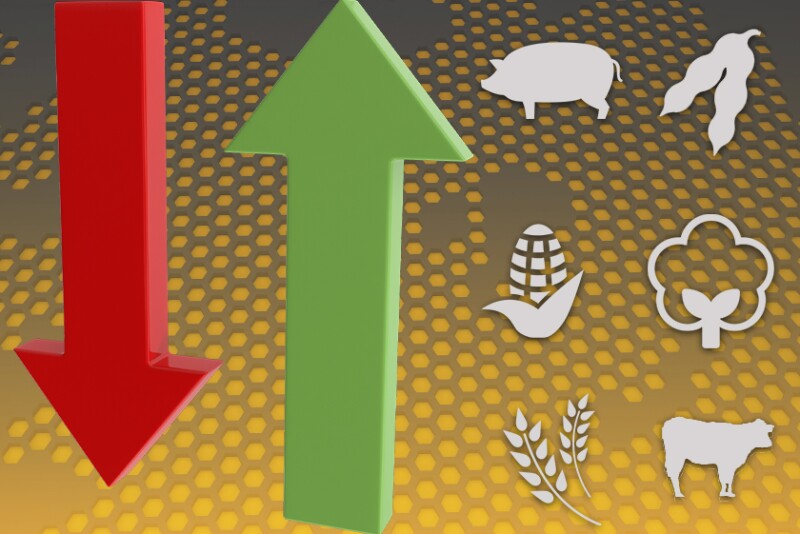GRAIN CALLS
Corn: Steady to 2 cents higher.
Soybeans: 7 to 9 cents higher.
Wheat: SRW 1 to 3 cents higher; HRW steady to 2 cents higher; HRS 3 to 5 cents higher.
GENERAL COMMENTS: Corn and wheat traded in a tight range near unchanged overnight, while soybeans saw corrective gains. Trading is likely to remain largely positioning ahead of today’s USDA reports. The Consumer Price Index (CPI) came in slightly higher than expectations, which sent the U.S. dollar index sharply higher and bonds lower as inflation has proved stickier than expected despite the Federal Reserve’s best efforts. While markets have stabilized ahead of the open, it is possible for volatility to rekindle following the open as traders digest what stickier inflation might mean for future monetary policy, as the narrative will likely shift back to “higher for longer” interest rates. Front-month crude oil futures are around $1.25 higher to start the day while the U.S. dollar index is around 150 points higher.
USDA will release its Crop Production and Supply & Demand Reports at 11:00 a.m. CT. USDA’s 2023-24 domestic balance sheets will reflect Sept. 1 stocks and the final 2023 wheat crop estimate, along with any changes to this year’s corn and soybean crop forecasts. Key will be what USDA does with its new-crop usage projections to account for the supply changes. Traders expect USDA to trim its production estimates to 15.101 billion bu. for corn and 4.134 billion bu. for soybeans. New-crop ending stocks are expected to come in at 2.138 billion bu. for corn (2.221 billion bu. in September), 233 million bu. for soybeans (220 million bu. in September) and 647 million bu. for wheat (615 million bu. in September).
In an escalation of the ongoing conflict, Israel conducted new airstrikes in Gaza, with Israeli leaders vowing to “obliterate” Hamas, the militant organization in control of the Gaza Strip. The crisis deepened on Wednesday when electricity was cut off in Gaza. Israel has maintained a blockade on the region, limiting its access to essential external fuel supplies. Markets have not reacted strongly to the crisis as traders are presently not factoring in an escalation of the conflict, meaning they don’t expect other countries like Iran, Syria or the U.S. to become actively involved. If that happens, market impacts would become greater.
The Rosario Grain Exchange cut its 2023-24 Argentine wheat crop estimate by 700,000 MT to 14.3 MMT. The exchange raised the outlook for the country’s soybean crop by 2 MMT to 50 MMT. Meanwhile, China’s ag ministry raised its 2023 corn production forecast by 3.29 MMT to a record 288.23 MMT, which would be up 11.03 MMT from last year. Despite the bigger production estimate, the ministry left its 2023-24 corn import forecast at 17.5 MMT.
Due to Monday’s government holiday, export sales data for the week ended Oct. 5 will be released Friday morning.
CORN: December corn futures traded in a tight range overnight, though favored the upside for the most part. Bulls struggled against initial resistance at the 40-day moving average, currently at $4.89. This is backed by resistance at $4.97 1/2. Bulls are seeking to hold support at $4.86, backed by $4.82, while additional selling pressure targets $4.74 support.
SOYBEANS: November soybean futures favored the upside overnight as prices bounced from technical support, though made a four-month low overnight. The $12.50 level marks initial support, then $12.40, while additional selling pressure targets $12.03. Bulls are targeting resistance of $12.72 then $12.76 3/4, with additional buying targeting $12.89.
WHEAT: December SRW futures traded near unchanged for most of the night ahead of today’s reports. Bulls are seeking strength above initial resistance of $5.59, backed by $5.65 then $5.74. Bears are seeking continuation of selling pressure below yesterday’s low of $5.51, targeting the contract low of $5.40.
LIVESTOCK CALLS
CATTLE: Choppy/lower.
HOGS: Choppy/lower.
CATTLE: Live cattle futures are expected to open mostly lower, continuing the series of recent choppy trade. Cash cattle trade has remained minimal throughout the week far, with light trading at steady prices reported in the far northern market. Wholesale prices continue to slide but remain supported at the $300.00 level and $275.00 area in Choice and Select, respectively. Choice cutout fell 78 cents to $300.27 on Wednesday, while Select slid 85 cents to $275.30.
HOGS: Lean hog futures are expected to open mostly lower in continuation of this week’s technical selling pressure. The CME lean hog index showed contra-seasonal strength early this week, as it rose 14 cents to $82.40 today (as of Oct 10), marking the first increase since Sept. 20. That strength could limit selling pressure in futures today, especially as the December contract holds a steep discount to the index. Wholesale pork prices dropped 68 cents to $92.39 on Wednesday, with losses across all cuts apart from a rise in bellies.

